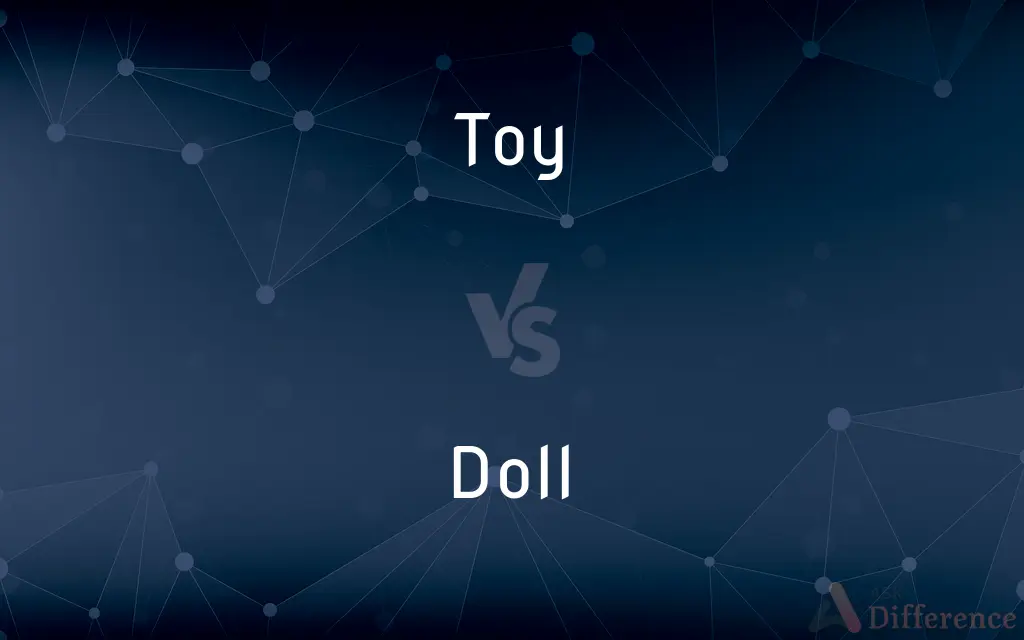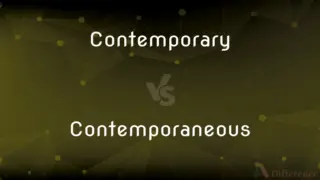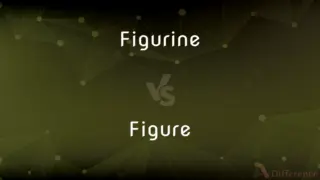Toy vs. Doll — What's the Difference?
By Tayyaba Rehman & Urooj Arif — Updated on April 23, 2024
A toy is a general term for objects used for play, while a doll specifically refers to a figure representing a human or mythical being, used primarily for imaginative play.

Difference Between Toy and Doll
Table of Contents
ADVERTISEMENT
Key Differences
A toy encompasses a wide range of playful items including games, construction sets, and electronic devices, designed to entertain and often educate. On the other hand, a doll is a specific type of toy modeled after humans or mythical creatures, traditionally used to encourage role-playing and storytelling.
Toys are made from various materials such as plastic, wood, and metal, catering to different play environments and age groups. In contrast, dolls are commonly crafted from materials like cloth, plastic, or porcelain, emphasizing features that enhance their lifelike appearance.
While toys can engage children in a variety of physical and cognitive activities, promoting skills like problem-solving and coordination, dolls typically focus on emotional and social development, helping children to emulate and understand human interactions.
The target age range for toys varies widely, offering appropriate options from infancy to adolescence. Conversely, dolls are often favored by younger children, particularly those in preschool to early elementary years, though collectors of all ages may value certain types of dolls.
Toys are available in gender-neutral options, promoting inclusivity and a broad appeal. However, dolls are frequently marketed based on traditional gender roles, with distinct styles and accessories intended for boys or girls, although this is slowly changing to embrace more diversity.
ADVERTISEMENT
Comparison Chart
Definition
Objects used for play and education
Figures representing humans or creatures
Materials Used
Plastic, wood, metal, etc.
Cloth, plastic, porcelain, etc.
Development Focus
Cognitive, physical skills
Emotional, social skills
Typical Age Range
From infants to adolescents
Preschool to early elementary
Marketing
Often gender-neutral
Traditionally gender-specific
Compare with Definitions
Toy
Any object designed for children to play with.
The colorful toy train was his favorite.
Doll
A small figure of a human or animal used for play.
Her collection of dolls included characters from many fairy tales.
Toy
Often includes items for outdoor and indoor play.
She packed a frisbee and other toys for the park.
Doll
May be used in role-playing games.
He used his superhero doll to act out adventures.
Toy
May feature electronic elements like robots or gaming consoles.
The electronic toy sang and danced at the push of a button.
Doll
Often dressed in various outfits or costumes.
The doll wore a beautiful princess gown.
Toy
Can be educational, such as puzzles or science kits.
His parents bought him a chemistry toy set for his birthday.
Doll
Can be collectible, with antique or designer models highly prized.
Her antique doll from the 1800s was kept in a glass case.
Toy
Designed to be safe for various age groups.
The toddler’s toys were all made of soft, chewable plastic.
Doll
Sometimes functions as comfort objects for children.
She always slept with her favorite doll by her side.
Toy
A toy is an item that is used in play, especially one designed for such use. It is mainly intended for use by children, though may also be marketed to adults under certain circumstances.
Doll
A doll is a model typically of a human or humanoid character, traditionally used as a toy for young girls. Dolls have also been used in religious rituals throughout the world.
Toy
An object for a child to play with.
Doll
A small model of a human figure, typically one of a baby or girl, used as a child's toy.
Toy
Something that provides amusement
"The profit on a toy like a motorcycle or a snowmobile is maybe a tenth that on a solid family car" (John Updike).
Doll
A temporary barrier on a racecourse or gallop.
Toy
A small ornament; a bauble.
Doll
Dress someone smartly and attractively
I got all dolled up for a party
Toy
Something of little importance; a trifle.
Doll
Place a barrier in front of (a jump or other part of the course that is to be omitted from a race)
Staff incorrectly dolled off a fence at the meeting
Toy
A diminutive thing, especially a dog of a very small breed or of a variety smaller than the standard variety of its breed.
Doll
A figure having the likeness of a human, especially one used as a child's toy.
Toy
(Scots) A loose covering for the head, formerly worn by women.
Doll
A person considered to be physically attractive.
Toy
Chiefly Southern US A shooter marble.
Doll
A woman.
Toy
To amuse oneself idly; trifle
A cat toying with a mouse.
Doll
A helpful or obliging person
What a doll you've been in this crisis!.
Toy
To treat something casually or without seriousness
Toyed with the idea of writing a play.
Doll
Used as a term of endearment.
Toy
Something to play with, especially as intended for use by a child.
A grown man does not play with a child’s toy.
Doll
A toy in the form of a human.
Action figure
Toy
A thing of little importance or value; a trifle.
Doll
(slang) An attractive young woman.
Toy
A simple, light piece of music, written especially for the virginal.
Doll
A term of endearment: darling, sweetheart.
Toy
(obsolete) Love play, amorous dalliance; fondling.
Doll
A good-natured, cooperative or helpful girl.
Toy
(obsolete) A vague fancy, a ridiculous idea or notion; a whim.
Doll
The smallest or pet pig in a litter.
Toy
An inferior graffiti artist.
Doll
A kind of barrier used in horse racing.
Toy
(obsolete) An old story; a silly tale.
Doll
(rail) A short signal post mounted on a bracket mounted on the main signal post, or on a signal gantry.
Toy
A headdress of linen or wool that hangs down over the shoulders, worn by old women of the lower classes; called also toy mutch.
Doll
A dollar.
Toy
A gun.
Doll
A small, usually flexible figure representing a human being, especially a toy baby for a little girl; a child's puppet.
Toy
To play (with) in an idle or desultory way.
To toy with a piece of food on one’s plate
Figo is toying with the English defence.
Doll
An attractive woman or girl.
Come along and be my party doll.
Toy
To ponder or consider.
I have been toying with the idea of starting my own business.
Doll
A small replica of a person; used as a toy
Toy
A plaything for children; a bawble.
Doll
Informal terms for a (young) woman
Toy
A thing for amusement, but of no real value; an article of trade of little value; a trifle.
They exchange for knives, glasses, and such toys, great abundance of gold and pearl.
Toy
A wild fancy; an odd conceit; idle sport; folly; trifling opinion.
To fly about playing their wanton toys.
What if a toy take 'em in the heels now, and they all run away.
Nor light and idle toys my lines may vainly swell.
Toy
Amorous dalliance; play; sport; pastime.
To dally thus with death is no fit toy.
Toy
An old story; a silly tale.
Toy
A headdress of linen or woolen, that hangs down over the shoulders, worn by old women of the lower classes; - called also toy mutch.
Toy
To dally amorously; to trifle; to play.
To toy, to wanton, dally, smile and jest.
Toy
To treat foolishly.
Toy
An artifact designed to be played with
Toy
A nonfunctional replica of something else (frequently used as a modifier);
A toy stove
Toy
Copy that reproduces something in greatly reduced size
Toy
Any of several breeds of very small dogs kept purely as pets
Toy
Behave carelessly or indifferently;
Play about with a young girl's affection
Toy
Manipulate manually or in one's mind or imagination;
She played nervously with her wedding ring
Don't fiddle with the screws
He played with the idea of running for the Senate
Toy
Engage in an activity as if it were a game rather than take it seriously;
They played games on their opponents
Play the stockmarket
Play with her feelings
Toy with an idea
Common Curiosities
Can toys be used for educational purposes?
Yes, many toys are designed to enhance learning and development, such as puzzles and building blocks.
Why are dolls often associated with girls?
Historically, dolls have been marketed towards girls as part of traditional gender roles, encouraging nurturing and role-play.
Are all dolls considered toys?
Yes, all dolls are considered toys, but they are a specific subtype focused on imaginative play.
What are some examples of toys that are not dolls?
Examples include sports equipment like balls, electronic games, and construction sets like LEGO.
What distinguishes a toy from a doll?
A toy is a broad category covering all play objects, while a doll specifically represents a human or mythical being.
At what age are children typically interested in dolls?
Children are typically interested in dolls during preschool to early elementary years.
How can dolls aid in a child's development?
Dolls help with emotional and social development by encouraging children to role-play and understand social interactions.
What materials are most commonly used to make toys?
Toys are made from a variety of materials including plastic, wood, and metal.
Are there toys designed specifically for outdoor use?
Yes, there are toys like balls, frisbees, and kites designed specifically for outdoor play.
What should be considered when choosing toys for infants?
Safety is paramount, so toys for infants should be large enough not to be swallowed, have no sharp edges.
Share Your Discovery

Previous Comparison
Contemporary vs. Contemporaneous
Next Comparison
Figurine vs. FigureAuthor Spotlight
Written by
Tayyaba RehmanTayyaba Rehman is a distinguished writer, currently serving as a primary contributor to askdifference.com. As a researcher in semantics and etymology, Tayyaba's passion for the complexity of languages and their distinctions has found a perfect home on the platform. Tayyaba delves into the intricacies of language, distinguishing between commonly confused words and phrases, thereby providing clarity for readers worldwide.
Co-written by
Urooj ArifUrooj is a skilled content writer at Ask Difference, known for her exceptional ability to simplify complex topics into engaging and informative content. With a passion for research and a flair for clear, concise writing, she consistently delivers articles that resonate with our diverse audience.














































